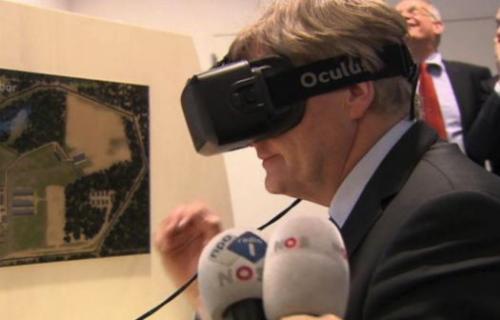Call for Proposals EHRI Workshop: Engaging New Generations - The Holocaust and Knowledge Dissemination in the Digital Age

International Workshop within the Framework of the European Holocaust Research Infrastructure
Thursday, 9 November 2017
Location: NIOD, Institute for War, Holocaust and Genocide Studies, Amsterdam
Young people often combine a great interest in the Holocaust with a low level of knowledge. That, at least, was the outcome of a recent digital survey that was conducted by EHRI with respondents from a variety of ages, education levels and nationalities. For these same young people, the Internet is the first place they turn to when searching for information. As a result, digital media are crucial when developing tools to address new generations and the way they relate to the Holocaust.
The recent Yolocaust-internet-art-project – that combined selfies from the Holocaust Memorial in Berlin with footage from Nazi extermination camps – might have been controversial but also shows par excellence the potential of digital media in this field. The project – already removed from the Internet – exposed the way young tourists behaved at the monument and contributed to (self-reflective) critical discussion.
At the conference ‘Engaging New Generations; The Holocaust and Knowledge Dissemination in the Digital Age’ we will question how recent digital developments, in particular those driven by creative and digital industries, can support Holocaust-related cultural and research institutions to extend their societal outreach. We focus on young people as a target group of consumers and – where possible – as producers of (digital) knowledge. We intend to bring together researchers and representatives of small and medium sized enterprises that contribute to Holocaust-related knowledge dissemination. In addition, we also aim to evaluate experiences with and discussions about (un)conventional non-digital media and explore recent comparable developments in the field of Genocide Studies.
The workshop will comprise four sessions that aim to address the following topics:
- Impact and social relevance of (un)conventional non-digital media (exhibitions, documentaries, movies, art, cartoons, re-enactments, musicals) for Holocaust-related knowledge dissemination. A good example is the project ‘Holocaust im Film’ of the ‘Gesellschaft zur Förderung der Film- und Medienkompetenz von Kindern und Jugendlichen’.
- Impact and social relevance of digital media for Holocaust-related knowledge dissemination (virtual reality, games, visualisations, citizen science projects). A good example is the (Dutch-language) Sobibor-Virtual-Reality-Project.
- Examples and experiences of collaboration between cultural and/or research institutions (museums, libraries, archives, research-infrastructures) and creative and/or digital industries in (further) developing digital methods and tools that integrate and disseminate information on the Holocaust. A good example is the collaboration between Google Arts & Culture and the Anne Frank House.
- Examples and experiences with digital knowledge dissemination in the field of Genocide Studies. A good example is the documentary/movie ‘The Act of Killing’ that deals with the Indonesian massacres of 1965 and that could not be officially released in Indonesia. In order to foster a larger discussion on the events, the film could be downloaded and screened for free in Indonesia.
Each accepted proposal will be allotted up to 20 minutes for presentation followed by discussion. The workshop will be conducted in English. All workshop sessions will be led by a moderator.
If you are interested in giving a presentation, please send a short proposal of no more than 500 words and a CV (including all relevant contact information) to:
Martijn Eickhoff, m.eickhoff@niod.knaw.nl
The deadline to submit proposals is July 31, 2017.
Notification will be sent via email by August 30, 2017.
The image shows the Dutch State Secretary for Health, Welfare and Sport Martin van Rijn who officially opens the project ‘Virtual Walk Sobibor’ at the Camp Vught National Memorial
Photo: RUIM toont dat het anders kan V.O.F.
Funding for travel and accommodation will be available for participants in accordance with European Commission guidelines and the EHRI project budget.
